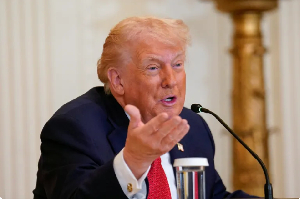Ghana has been urged to adopt measures to tap into the potential of the financial technology (Fintech) sector for sustainable economic development.
This is because the sector could drive foreign capital into the country to support economy recovery and transformation, making it resilient for long-term inclusive development.
Mr Darryl Abraham Mawutor, the Growth Director in charge of Africa, Taptap Send, a remittance company, who said this urged the Government to create an enabling environment to make the fintech sector thrive in Ghana.
He said this in an interview with the Ghana News Agency after a conference to educate some school children in Accra on fintech, attended by 150 students from seven Senior High Schools (SHSs).
Mr Mawutor noted that fintech had the potential to bring in about $10 billion by 2025 and serve as a major catalyst for economic recovery and long-term national development.
He said: “Fintech has helped Ghana a lot and has the potential to help us get out of the immediate economic situation we find ourselves in as a country and build a long-term sustainable economy that we want for our children the generation to come.”
“There’s a limit to commodities like Gold, Diamond, Manganese and Gold, which we’ve relied on for a long time, but new ideas and products and services in the fintech space are limitless, so, let’s capitalise on such opportunities,” he said.
He said their fintech-oriented company was helping move capital into Ghana through remittances, which could grow to about $5bn this year, and called on the Government and regulatory authorities to drive diaspora investment into fintech.
Mr Mawutor said that Tatptap Send was supporting the training of young people across the country through programmes such as the Child-in-tech conference to create access and pump in capital into Ghana.
Miss Akosua Oppong-Mensah, a fintech consultant, added that there was the need for the government to create policies that would allow startups to grow and work collaboratively with financial and educational institutions.
She said: “Fintech plays a critical role in today’s economic development and creating generational wealth. We must, therefore, capitalise on the opportunities to create generational wealth and move from hand-to-mouth to a stable and sustainable economy.”
Miss Abena Nyamesem, the Head of Sustainability and Partnerships at the Ghana Investment Fund for Electronic Communications (GIFEC), also underscored the relevance of fintech in economic development.
She said GIFEC had, therefore, been supporting individuals and communities with digital skills to ensure that artisans, market women and the youth, were all not left behind in the digital transformation agenda.
She said GIFEC had also helped small and Medium-sized Enterprises (SMEs) in rural Ghana by promoting fintech and helping telecommunication companies to extend their services in those areas to engender economic transformation.
Ms Nyamesem, however, said: “The Government cannot do it alone; we need added support from individuals and the corporate world to make these skills more practical and expand the talent of our school children in fintech.”
Business News of Friday, 20 January 2023
Source: GNA













